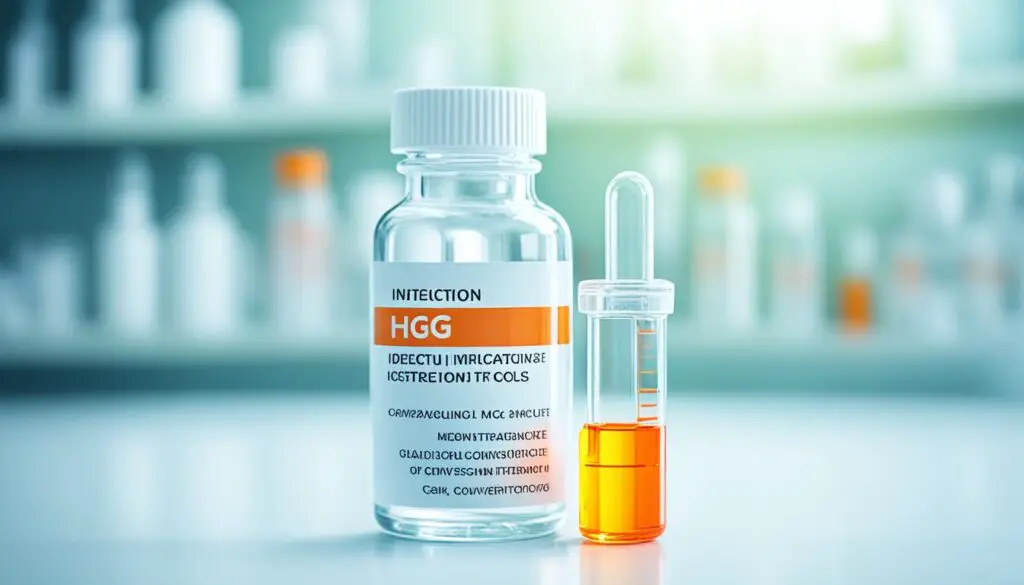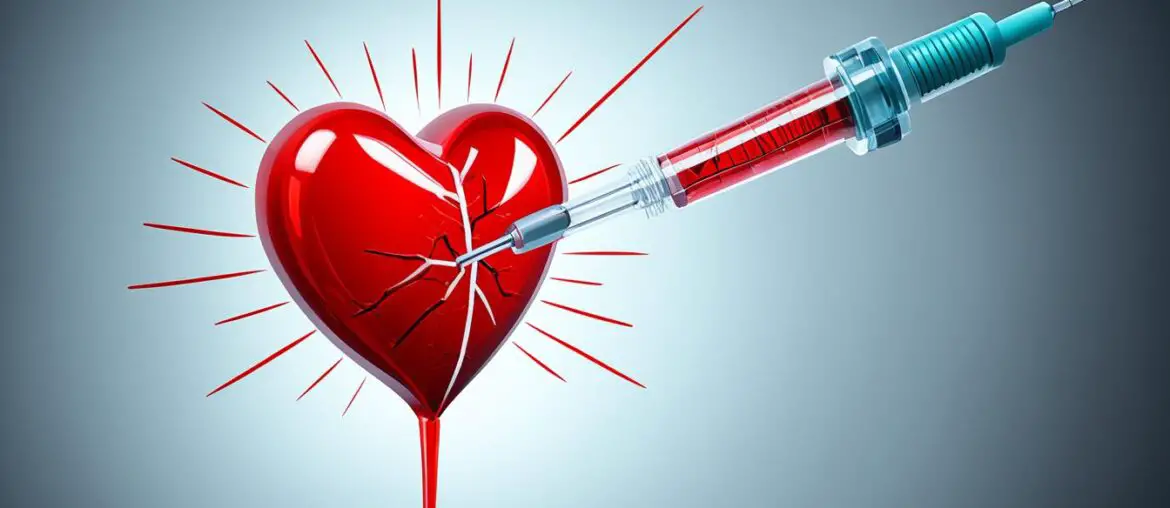Did you know that the HCG diet, a popular weight loss method, has potential risks to heart health? While it may seem like a quick fix, this controversial diet could have serious implications for your cardiovascular well-being.
The HCG diet involves severe calorie restriction, typically ranging from 500 to 800 calories per day. While some research has linked HCG weight-loss products to a possible increase in cancer risk, the main concern lies in the potential impact on heart health. Limited calorie intake can lead to a host of cardiovascular concerns such as irregular heartbeat, gallstone formation, and an increased risk of blood clots.
Additionally, side effects reported with the HCG diet include fatigue, irritability, depression, fluid buildup, and swelling of the breasts in males. The FDA has advised against the use of over-the-counter HCG products for weight loss, stating that they are illegal and ineffective.
To ensure safe and sustainable weight loss that prioritizes heart health, it is recommended to consult with a healthcare provider. Let’s delve deeper into the risks associated with HCG diet injections and explore alternative approaches to weight management that support your cardiovascular well-being.
Key Takeaways:
- The HCG diet may pose risks to heart health due to severe calorie restriction.
- Potential cardiovascular concerns include irregular heartbeat, gallstone formation, and an increased risk of blood clots.
- Side effects of the HCG diet can range from fatigue and irritability to depression and fluid buildup.
- The FDA has deemed over-the-counter HCG products for weight loss illegal and ineffective.
- Consulting with a healthcare provider is crucial for safe and sustainable weight loss methods that prioritize heart health.
Understanding the HCG Diet and its Controversy
The HCG diet is a weight loss method that involves the use of HCG, a hormone produced during pregnancy, alongside a very low-calorie diet. The controversial nature of this diet has sparked concerns and debates among medical professionals and regulators.
The FDA, the regulatory body responsible for overseeing food and drug safety in the United States, has advised against the use of over-the-counter HCG products for weight loss. They state that these products are not only ineffective but also illegal.
Scientific evidence supporting the claims of the HCG diet is limited. While some individuals may experience weight loss while following this diet, the severe calorie restriction it imposes can have detrimental effects on overall health.
One significant concern associated with the HCG diet is its potential increased risk of cancer. The calorie restriction may compromise the body’s immune system and its ability to fight cancerous cells. Although further research is needed to establish a direct link, it is essential to approach the HCG diet with caution.
Quoting the FDA:
“Over-the-counter products labeled as ‘homeopathic’ HCG are illegal and make unproven claims for weight loss. The FDA and the Federal Trade Commission (FTC) are taking action against companies that sell these products.”
It is crucial to prioritize nutrition and choose weight loss methods that are sustainable, safe, and supported by scientific evidence. Consulting a healthcare professional is essential for personalized guidance on effective weight loss strategies that promote overall health and well-being.
Potential Heart Health Risks associated with HCG Diet Injections

While there is no definitive evidence linking HCG diet injections directly to heart health risks, reports of cardiac emergencies occurring in individuals following the diet have raised concerns. One cardiologist shared the experience of two patients who went into cardiac arrest while on the HCG diet. The severe calorie restriction and potential for electrolyte imbalances could contribute to irregular heartbeat and other cardiovascular issues.
Additionally, the risk of blood clots forming and blocking blood vessels, known as thromboembolism, is a serious concern with the HCG diet. These blood clots can lead to life-threatening conditions such as pulmonary embolism, heart attack, or stroke. Given the potential impact on heart health, it is crucial to prioritize the well-being of your heart when considering any weight loss program.
Consulting a healthcare professional is essential to assess your individual risks and receive personalized advice on the potential heart health risks associated with HCG diet injections. A medical expert can evaluate your overall health status, medical history, and current medications to provide guidance that aligns with your unique needs. Your healthcare provider can also recommend alternative weight loss strategies that prioritize heart health while helping you achieve your goals.
“The severe calorie restriction and potential electrolyte imbalances associated with the HCG diet can have detrimental effects on heart health, leading to irregular heartbeat and other cardiovascular complications.”
When embarking on any weight loss journey, it is crucial to prioritize your heart health and make informed decisions that are backed by scientific evidence. Remember that sustainable weight loss is a gradual process that involves adopting healthy eating habits, engaging in regular physical activity, and seeking guidance from healthcare professionals. Prioritizing your heart health ensures that you are not compromising your overall well-being in pursuit of weight loss.
Lack of Scientific Evidence for the Safety and Efficacy of the HCG Diet
Despite its popularity, the HCG diet lacks scientific evidence to support its safety and efficacy. While proponents claim rapid weight loss and muscle preservation, there is no scientific data to back these claims. The FDA does not support the use of HCG for weight loss, and medical professionals caution against the severe calorie restriction and potential nutrient deficiencies associated with the diet. It is crucial to rely on evidence-based weight loss strategies that prioritize overall health.
The lack of scientific evidence surrounding the HCG diet raises concerns about its safety and effectiveness. While anecdotal success stories abound, there is a distinct absence of rigorous scientific studies that validate the claims made about this controversial weight loss method.
“The evidence supporting the use of HCG injections for weight loss is virtually nonexistent. There are no well-designed studies that demonstrate its efficacy or safety.”
Medical professionals have long voiced their reservations about the HCG diet due to its extreme calorie restriction, potential nutrient deficiencies, and potential for side effects. The concept of injecting a hormone produced during pregnancy for weight loss purposes raises eyebrows and lacks solid scientific grounding.
The FDA, the authority responsible for evaluating the safety and effectiveness of weight loss products, has made it clear that they do not support the use of HCG for weight loss. The absence of FDA approval underscores the lack of scientific evidence and highlights the potential risks associated with the HCG diet.
It is important to approach weight loss with caution and prioritize methods that have the backing of scientific research. Consultation with healthcare professionals can provide guidance on safe and effective weight loss strategies that align with individual health needs and goals.
List of Potential Risks Associated with the HCG Diet
- Severe calorie restriction leading to nutrient deficiencies
- Potential side effects such as fatigue, irritability, and depression
- Ineffective long-term weight loss maintenance
- Potential disruption of hormonal balance
- Potential for muscle loss due to calorie deficit
List of Safer Alternatives to the HCG Diet
- Adopting a balanced and varied diet
- Incorporating regular physical activity
- Seeking guidance from healthcare professionals
- Considering evidence-based weight loss programs
- Adopting a balanced and varied diet
- Incorporating regular physical activity
- Seeking guidance from healthcare professionals
- Considering evidence-based weight loss programs
| Evidence-based Weight Loss Program | Benefits |
|---|---|
| Medically supervised weight loss programs | Professional guidance and monitoring |
| Behavioral weight loss programs | Focus on sustainable lifestyle changes |
| Healthy eating and portion control | Promotes long-term weight maintenance |
Concerns Over Nutrient Deficiencies and Metabolic Imbalances
The HCG diet’s severe calorie restriction and limited food choices raise concerns about nutrient deficiencies and metabolic imbalances. The diet restricts important food groups such as starchy vegetables, grains, and legumes, which are sources of essential vitamins, minerals, and fiber. This could lead to deficiencies in B vitamins, fat-soluble vitamins, and other nutrients. Moreover, the low-calorie intake may slow down metabolism, making it difficult to sustain weight loss in the long term. It is important to prioritize a balanced and varied diet for sustainable weight loss and overall health.
| Nutrient | Importance | Food Sources |
|---|---|---|
| B Vitamins | Essential for energy production, brain function, and cell metabolism | Lentils, spinach, bananas, whole grains |
| Fat-soluble Vitamins (Vitamin A, D, E, K) | Crucial for vision, bone health, immune function, and blood clotting | Eggs, fatty fish, green leafy vegetables, nuts |
| Calcium | Supports bone health, muscle function, and nerve transmission | Dairy products, fortified plant-based milk, broccoli |
| Fiber | Aids in digestion, promotes satiety, and supports healthy cholesterol levels | Whole grains, fruits, vegetables, legumes |
The HCG diet’s limited food choices may result in a significant reduction in these vital nutrients, increasing the risk of nutrient deficiencies. Moreover, the low-calorie intake associated with the diet can slow down the metabolism, making it challenging to maintain weight loss in the long run. Prioritizing a balanced and varied diet that includes a wide range of nutrient-rich foods is essential for sustainable weight loss and overall health.
It’s important to remember that no single diet can provide all the necessary nutrients for optimal health. Consulting with a healthcare professional or registered dietitian can help develop a personalized and balanced weight loss plan that meets individual nutritional needs while promoting long-term overall well-being.
The FDA’s Stance on HCG Diet Injections

The FDA firmly opposes the use of HCG diet injections and has deemed HCG diet products to be illegal. The agency cautions against the consumption of over-the-counter weight-loss products that contain HCG, as these products are both ineffective and potentially harmful. It is important for consumers to be aware that companies selling such products are in violation of the law. Exercise caution and consult with healthcare professionals to explore safe and evidence-based approaches to weight management.
Risks of Rapid Weight Loss and Yo-Yo Dieting
Rapid weight loss can have detrimental effects on long-term health, especially when it is achieved through extreme diets like the HCG diet. The pattern of yo-yo dieting, characterized by the repeated loss and regain of weight, has been associated with increased risks of heart disease, diabetes, and other chronic conditions.
The body’s natural response to severe calorie restriction is to conserve energy and slow down metabolism. This can make it challenging to maintain weight loss and may contribute to weight regain over time.
To prioritize overall health and well-being, it is vital to adopt sustainable and balanced approaches to weight management. Instead of resorting to rapid weight loss methods, such as the HCG diet, focusing on long-term lifestyle changes, including a nutritious diet and regular physical activity, can lead to more sustainable and beneficial outcomes.
“Yo-yo dieting, characterized by the repeated loss and regain of weight, has been associated with increased risks of heart disease, diabetes, and other chronic conditions.”
By understanding the potential risks of rapid weight loss and yo-yo dieting, individuals can make informed decisions about their weight loss journey and prioritize their long-term health.
The Effects of Yo-Yo Dieting on Health
Yo-yo dieting, also known as weight cycling, is a common phenomenon where individuals go through cycles of losing and regaining weight. This pattern of weight fluctuation can have several negative health effects:
- Increased risk of heart disease: Research has indicated that yo-yo dieting can contribute to an increased risk of heart disease. The frequent changes in weight and body composition may lead to unfavorable alterations in cardiovascular health markers, such as blood pressure and cholesterol levels.
- Higher likelihood of diabetes: Yo-yo dieting has been associated with an elevated risk of developing type 2 diabetes. The fluctuation in weight and body fat levels can negatively impact insulin sensitivity and disrupt glucose metabolism.
- Impaired metabolism: The body’s response to repeated weight loss and regain is often a reduction in metabolism. This metabolic adaptation slows down the rate at which the body burns calories, making it more challenging to lose weight and maintain weight loss in the long term.
- Loss of muscle mass: Yo-yo dieting can lead to the loss of muscle mass, which is essential for overall health and metabolic function. Muscle burns more calories than fat, so a decrease in muscle mass may further contribute to a slower metabolism.
To achieve lasting weight loss and improve health outcomes, it is crucial to move away from yo-yo dieting and focus on sustainable lifestyle changes that promote overall well-being.
| Risks of Rapid Weight Loss and Yo-Yo Dieting | Effect on Health |
|---|---|
| Rapid weight loss | Increased risk of heart disease, diabetes, and other chronic conditions |
| Yo-yo dieting | Higher likelihood of heart disease and diabetes, impaired metabolism, loss of muscle mass |
Safer Alternatives for Weight Loss and Heart Health
Instead of resorting to extreme diets like the HCG diet, there are safer alternatives for weight loss that also support heart health.
A balanced and varied diet: Focus on consuming nutrient-dense foods that provide essential vitamins, minerals, and antioxidants. Include a variety of fruits, vegetables, whole grains, lean proteins, and healthy fats in your daily meals.
Regular physical activity: Engage in regular exercise to promote weight loss and improve cardiovascular health. Aim for at least 150 minutes of moderate-intensity aerobic activity or 75 minutes of vigorous activity per week.
Personalized guidance from healthcare professionals: Consult with healthcare professionals, such as registered dietitians or doctors specializing in weight management, for personalized advice and support. They can help you create a customized plan that aligns with your individual needs and goals.
“A balanced and varied diet, regular physical activity, and personalized guidance from healthcare professionals are key components of a safer weight loss journey.”
By prioritizing overall health and adopting these safer alternatives, you can achieve sustainable weight loss while simultaneously improving heart health. It’s essential to make informed decisions and seek professional guidance to ensure a healthy and effective approach to weight management.
The Importance of Consultation with Healthcare Professionals

Before embarking on any weight loss journey, it is crucial to consult with healthcare professionals. They can provide personalized guidance based on your individual health status, medical history, and specific needs. By seeking the expertise of healthcare professionals, you can ensure that your weight loss plan is safe, effective, and tailored to prioritize heart health and overall well-being.
The role of healthcare professionals in weight management goes beyond simply providing advice. They have the knowledge and experience to create a comprehensive weight loss plan that takes into account your unique circumstances, including any underlying health conditions or medications you may be taking.
Personalized guidance from healthcare professionals is invaluable as it enables you to make informed decisions about the most appropriate and sustainable approach to weight management. They can help you set realistic goals, monitor your progress, and make adjustments to your plan as needed. This personalized support increases the likelihood of success and reduces the risk of potential health complications.
The Benefits of Consultation with Healthcare Professionals
“Consulting with healthcare professionals for personalized guidance ensures that your weight loss plan is safe, effective, and tailored to your individual needs.”
Consultation with healthcare professionals offers several specific benefits:
- Accurate assessment of your current health condition
- Identification of any underlying health concerns that may affect your weight loss journey
- Creation of a personalized weight loss plan that considers your unique circumstances and goals
- Monitoring of your progress and guidance on making necessary adjustments
- Education and guidance on proper nutrition, physical activity, and lifestyle changes
- Support and motivation throughout your weight loss journey
The importance of consultation with healthcare professionals cannot be overstated. They possess the knowledge and expertise to guide you through a safe and effective weight loss journey while prioritizing your heart health and overall well-being.
The Role of Education and Research in Making Informed Decisions

Educating oneself and conducting thorough research are crucial when it comes to making informed decisions about weight loss methods. By staying updated with the latest scientific evidence and seeking advice from reputable sources, individuals can prioritize their overall health and well-being. It is essential to critically evaluate the claims of any weight loss program and consult healthcare professionals who provide evidence-based guidance.
Benefits of Education and Research
- Empowers individuals to make informed choices
- Provides a deeper understanding of weight loss methods and their potential effects
- Enables individuals to identify reputable sources and distinguish between valid information and unfounded claims
- Helps individuals recognize potential risks and make safer choices
Education equips individuals with knowledge, enabling them to critically analyze and evaluate weight loss programs. Research plays a vital role in uncovering the long-term effects and efficacy of various methods, enabling individuals to make evidence-based decisions.
Quoting Expert Advice
“Staying well-informed is essential when considering weight loss methods. Education and research are the pillars of making informed decisions that prioritize your health and well-being.” – Dr. Jane Peterson, Weight Loss Specialist
Key Considerations
When conducting research and evaluating weight loss methods, keep the following in mind:
- Look for reputable sources such as medical journals, healthcare organizations, and trusted experts.
- Consider the quality and reliability of the studies and research articles reviewed.
- Take into account individual needs, health conditions, and potential contraindications.
- Consult healthcare professionals who specialize in weight loss for personalized guidance.
Comparing Education and Research in Weight Loss Decision-Making
| Education | Research |
|---|---|
| Empowers individuals to make informed choices | Provides evidence-based information |
| Enables critical evaluation of weight loss programs | Uncovers long-term effects and efficacy |
| Helps identify reputable sources | Provides insights into potential risks |
| Allows individuals to understand their unique needs | Guides decision-making based on validated data |
Conclusion
The HCG diet, with its severe calorie restriction and controversial use of injections, raises concerns about its impact on heart health. While individual experiences may vary, there is insufficient scientific evidence to support the safety and efficacy of the HCG diet. It is important to prioritize heart health and choose weight loss methods that are supported by research and medical professionals. Consulting with healthcare professionals and adopting sustainable lifestyle changes can promote long-term weight management and cardiovascular well-being.
When it comes to weight loss, it is crucial to consider the potential risks and benefits. The HCG diet, although popular, lacks the scientific backing and approval from regulatory bodies like the FDA. The severe calorie restriction associated with this diet can lead to a range of cardiovascular concerns, including irregular heartbeat, gallstone formation, and an increased risk of blood clots. Additionally, reported side effects such as fatigue, irritability, and fluid buildup further highlight the potential risks.
Rather than resorting to extreme and potentially risky methods like the HCG diet, it is advisable to seek guidance from healthcare professionals. They can provide personalized advice and recommend safer alternatives that prioritize heart health. By making informed decisions based on scientific evidence and professional guidance, individuals can achieve sustainable weight loss while safeguarding their cardiovascular well-being.
FAQ
Are HCG diet injections safe for heart health?
There is limited scientific evidence to support the safety of HCG diet injections for heart health. Severe calorie restriction and potential electrolyte imbalances could contribute to irregular heartbeat and other cardiovascular issues.
What are the potential risks associated with HCG diet injections?
The potential risks of HCG diet injections include cardiac emergencies, blood clot formation, irregular heartbeat, gallstone formation, and an increased risk of thromboembolism.
Is there scientific evidence supporting the safety and efficacy of the HCG diet?
No, there is a lack of scientific evidence supporting the safety and efficacy of the HCG diet. The FDA does not support the use of HCG for weight loss.
Are there concerns regarding nutrient deficiencies and metabolic imbalances with the HCG diet?
Yes, the severe calorie restriction and limited food choices of the HCG diet raise concerns about nutrient deficiencies and metabolic imbalances.
What is the FDA’s stance on HCG diet injections?
The FDA has declared that HCG diet products are illegal and does not support their use for weight loss.
What are the risks of rapid weight loss and yo-yo dieting?
Rapid weight loss and yo-yo dieting have been linked to increased risks of heart disease, diabetes, and other chronic conditions.
What are safer alternatives for weight loss and heart health?
Safer alternatives for weight loss and heart health include a balanced and varied diet, regular physical activity, and personalized guidance from healthcare professionals.
How important is consultation with healthcare professionals before starting a weight loss journey?
It is crucial to consult with healthcare professionals before starting a weight loss journey to receive personalized guidance and ensure the most appropriate and safe approach to weight management.
What role does education and research play in making informed decisions about weight loss methods?
Education and research are important in helping individuals make informed decisions about weight loss methods. Staying informed about the latest scientific evidence and seeking guidance from trusted sources is crucial.




